Parties as Brands: How Canadians See the Conservatives, Liberals and NDP
August 11, 2017
In our latest nationwide survey, we wanted to see what thoughts and images were more associated with Canada’s three largest political brands. To do this, we offered people a series of 20 forced choices, far from an exhaustive list of possible variables, but enough to observe some powerful differences.
This is the first of a few reports we will release using this data.
In a nutshell, here’s what we found:
— The 10 strongest associations with the Conservative Party were “old fashioned”, “proud of Canada” “oil” “tough on crime” “favour some over others” doesn’t care about you” spends on the wrong things” “elitist”, “does not trust people” and “economically savvy”.
— The 10 strongest for the Liberal Party were: “diplomacy” “treat men and women equally” “proud of Canada” “cares about the environment” “projects positive image of Canada” “young at heart” “future oriented” “individual freedom” “renewable energy” and “hopeful”.
— 8 of 10 strongest for the NDP were the same as for the Liberal Party. The items that were different: the NDP did not have “future oriented” or “young at heart” but instead had “down to earth” and “trust people”.
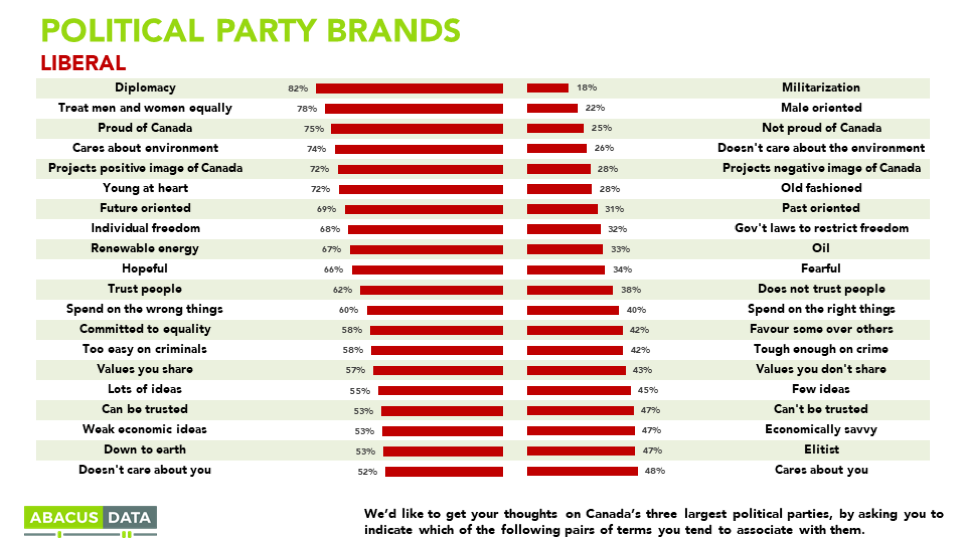
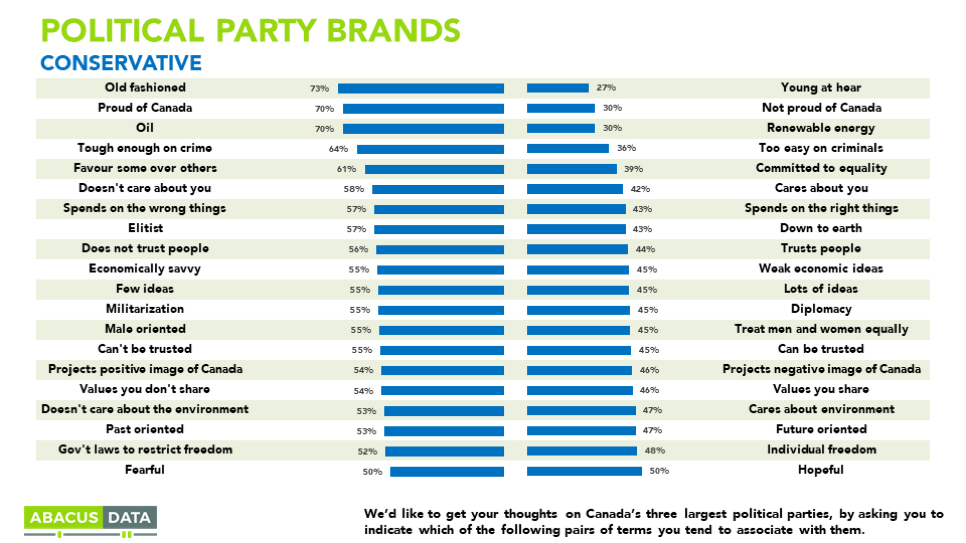
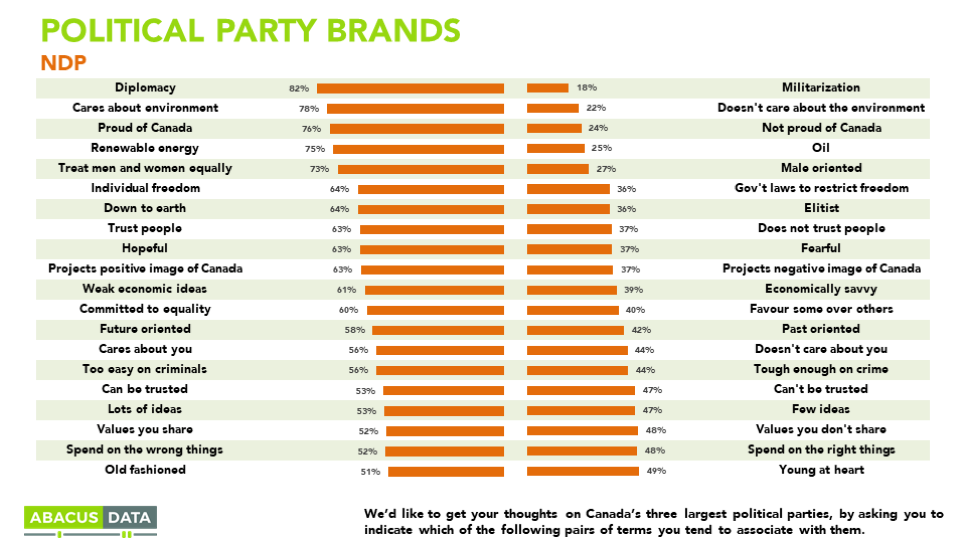
— Comparing the three parties shows that on “VALUES YOU SHARE” 57% associated this with the Liberals, compared to 52% for the NDP and 46% for the Conservatives.
— Interestingly, on “CARES ABOUT INDIVIDUAL FREEDOM” v “GOVERNMENT LAWS TO RESTRICT FREEDOM”. Quite a few more people associated “freedom” with the Liberals (68%) and the NDP (64%) than the Conservatives (48%)
— When it came to “ECONOMICALLY SAVVY”, the Conservatives (55%) were better positioned than the Liberals (47%) and NDP (39%)
To help isolate the differences between the Conservatives and the Liberals, and the Liberals and the NDP, the following charts are revealing.
— Compared to the Liberals, the Conservatives are seen as more old fashioned, past oriented, militaristic, oil oriented, male oriented, less concerned about the environment, equality, or individual freedom, less inclined to trust people, and tougher on crime. The Liberals are more associated with young at heart, a future orientation, gender equality, equality and freedom more generally, concern for the environment, diplomacy over militarization, and projecting a positive image of Canada.
— Comparing the Liberals and the NDP, unsurprisingly, differences are more muted. The Liberals are seen as somewhat younger at heart, future oriented, while the NDP are seen as a bit more down to earth.
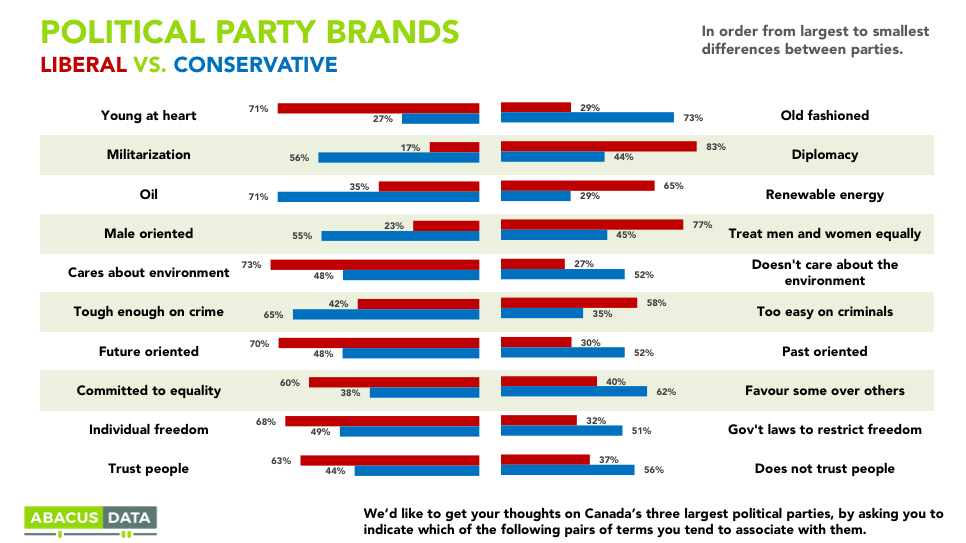
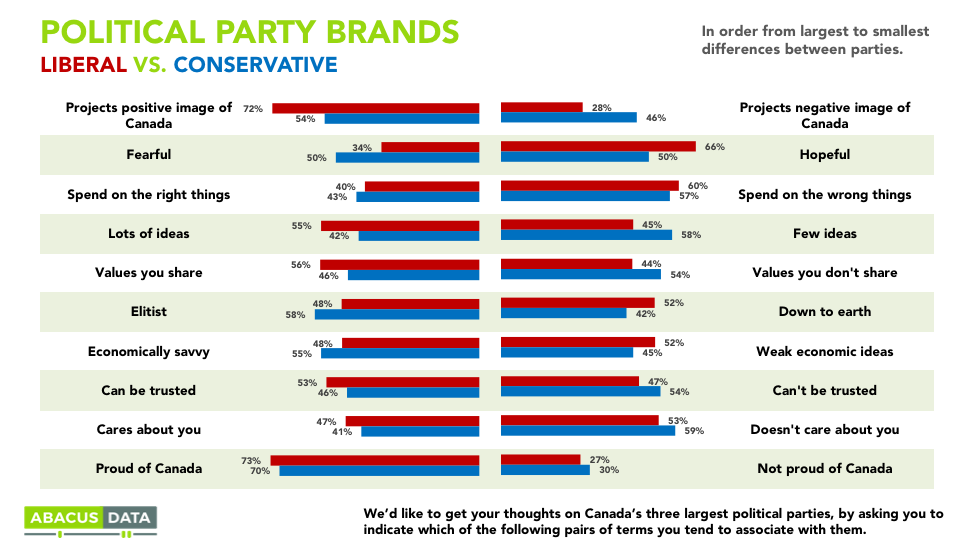
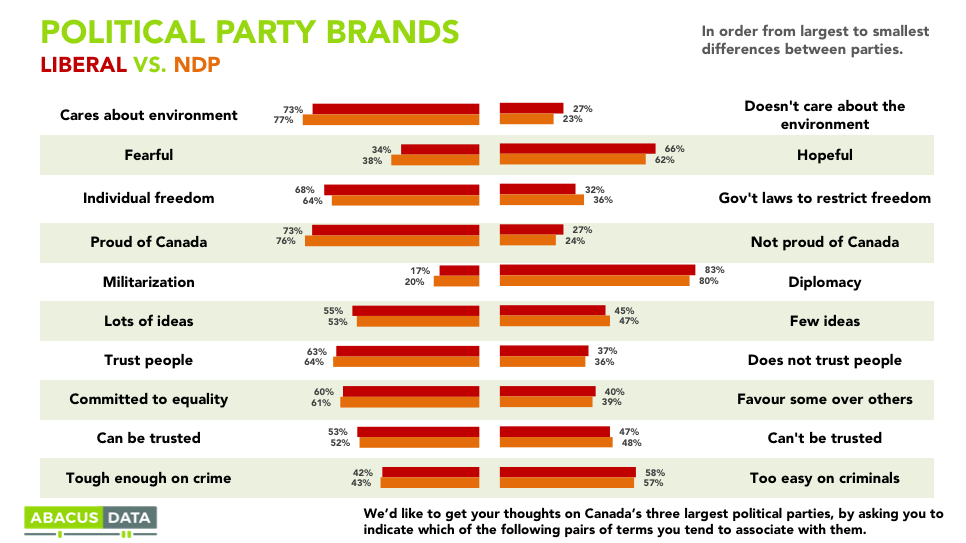

UPSHOT
According to Bruce Anderson: “Party brand images build up over time and are affected by the choices leaders make but also help inform leaders of the choices they need to consider in order to expand their pool of potential voters. For the Liberals, the numbers provide a reminder of the need to constantly make the case for their economic policies and to avoid suggestions of elitism. For the NDP, the striking news here is the degree to which the party can be seen as aging and old-fashioned.
For the Conservatives, the findings are clearer and inescapably point to the fact that the things which make their core vote most enthusiastic may often be the things that repel other voters. On gender equality, the environment and energy, and respect for individual freedoms, the Conservative brand finds itself somewhat isolated from a fair number of voters.
Perhaps the most disconcerting signal for the CPC is the fact that in a world where the future seems to be one of constant change and adaptation, their is party not, for the moment anyway, convincingly forward looking.”
According to David Coletto: “The Liberal brand, in trouble only a few years ago, is today the strongest with more people reflecting positive images onto it. It’s a forward-thinking, youthful, and hopeful party.
In contrast, the Conservative brand is under far more stress. Seven in ten feel it is old fashioned, far more associate it with oil than with renewable energy, and more describe it elitist than the other two major parties. It seems to me the Conservative Party needs to rethink its brand and approach in much the same way the UK Conservatives evolved after 2005 when it failed to beat the Blair led Labour Party for the third consecutive time. This is especially important given the immense generational change occurring in the electorate.
If I’m the NDP, these results point to a party with many brand strengths but few differentiators with its primary competitor, the Liberal Party. How the NDP differentiates itself should be the focus every NDP leadership candidate should consider at it plans how to take on Mr. Trudeau and the Liberals in 2019.
METHODOLOGY
Our survey was conducted online with 2,000 Canadians aged 18 and over from August 4 to 7, 2017. A random sample of panelists was invited to complete the survey from a large representative panel of over 500,000 Canadians.
The Marketing Research and Intelligence Association policy limits statements about margins of sampling error for most online surveys. The margin of error for a comparable probability-based random sample of 2,000 is +/- 2.2%, 19 times out of 20.
The data were weighted according to census data to ensure that the sample matched Canada’s population according to age, gender, educational attainment, and region. Totals may not add up to 100 due to rounding.
ABACUS DATA INC.
We offer global research capacity with a strong focus on customer service, attention to detail and value-added insight. Our team combines the experience of our Chairman Bruce Anderson, one of Canada’s leading research executives for two decades, with the energy, creativity and research expertise of CEO David Coletto, Ph.D.




